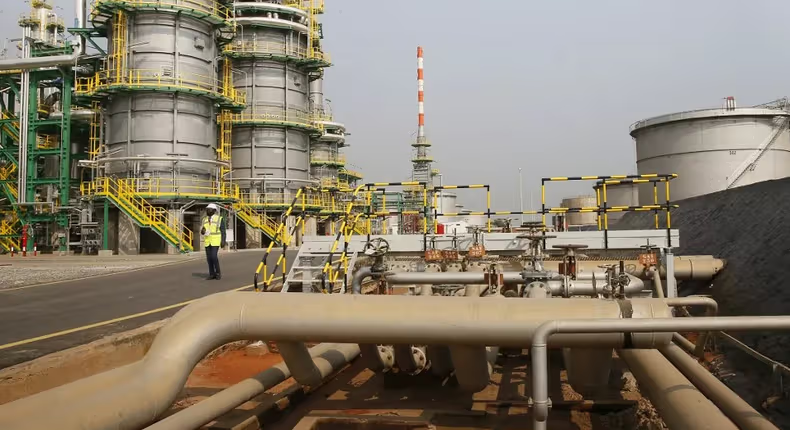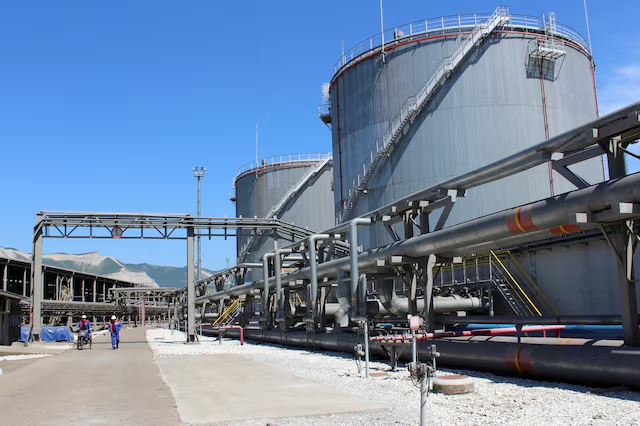Zambia Commissions 347MW Renewable Energy Projects After 2024 Drought Pushed Nation Into Power Crisis
Ghana Launches Net-Metering Web Portal To Boost Rooftop Solar Adoption

UK: Equinor, Shell Combine UK Assets To Form New Company
Ghana: BOST Energies Company Limited Wins Petroleum Company Of The Year Award
Nigeria: TotalEnergies To Sell 40% Stake In Two Exploration Licenses To Chevron

Ghana: Institutions Of Engineering & Technology Ghana Honours Managing Director Of Tema Oil Refinery Ltd.
 In concluding his remarks, he stressed that “TOR’s problem over the years has not been about the engineers, but rather a lack of effective leadership.”
He further noted that “all the human capacity we need to transform Ghana is here in the country,” reaffirming his belief in Ghana’s technical talent and the importance of strong leadership in unlocking the nation’s potential.
In concluding his remarks, he stressed that “TOR’s problem over the years has not been about the engineers, but rather a lack of effective leadership.”
He further noted that “all the human capacity we need to transform Ghana is here in the country,” reaffirming his belief in Ghana’s technical talent and the importance of strong leadership in unlocking the nation’s potential.

Ghana: VRA CEO Ing. Obeng-Kenzo Named Energy Personality Of The Year At 9th Ghana Energy Awards

 Meanwhile, the Volta River Authority also won the Health, Safety, Security and Environment (HSSE) Excellence Award, recognising its strong commitment to workplace safety, environmental stewardship, and operational excellence.
Meanwhile, the Volta River Authority also won the Health, Safety, Security and Environment (HSSE) Excellence Award, recognising its strong commitment to workplace safety, environmental stewardship, and operational excellence. Kazakhstan Tells Ukraine To Stop Attacking CPC Terminal After Oil Exports Halted
Ghana: Stop Rushing To Accident Scenes Involving Fuel Tankers To Siphon Fuel – NPA Warns
Ghana Gas CEO Named Female Energy Personality Of The Year
 Since her appointment in March 2025, Ms. Judith Adjobah Blay has been rallying staff and working tirelessly to ensure efficiency in the company’s operations while cutting waste.
During the recent shutdown maintenance of the company’s Atuabo Gas Processing Plant, Ms. Adjobah Blay worked from both the company’s head office in Accra and the plant in the Western Region, helping to complete the exercise ahead of schedule.
With over two decades of experience in Ghana’s energy sector, Judith Adjobah Blay is the first female to assume the role of CEO at Ghana Gas since the company’s inception. She is recognised for her expertise in strategic growth, regulatory compliance, and local content development.
Prior to her appointment, she served as Manager of Community Relations at the Petroleum Commission, where she integrated ESG (Environmental, Social, and Governance) principles into industry strategies.
She also played a key role in procurement and supply chain management at the Bui Power Authority and contributed to large-scale energy reforms as a Project Coordinator at the Ministry of Energy.
Ms. Adjobah Blay is a chartered member of the Chartered Institute of Procurement & Supply (CIPS-UK) and holds an MA in International Transactions from George Mason University (USA), an MSc in Procurement & Supply Chain Management from KNUST, and a BA in French and Linguistics from the University of Ghana. She is also pursuing an LLM in Public Procurement Law & Policy at the University of Nottingham.
Since her appointment in March 2025, Ms. Judith Adjobah Blay has been rallying staff and working tirelessly to ensure efficiency in the company’s operations while cutting waste.
During the recent shutdown maintenance of the company’s Atuabo Gas Processing Plant, Ms. Adjobah Blay worked from both the company’s head office in Accra and the plant in the Western Region, helping to complete the exercise ahead of schedule.
With over two decades of experience in Ghana’s energy sector, Judith Adjobah Blay is the first female to assume the role of CEO at Ghana Gas since the company’s inception. She is recognised for her expertise in strategic growth, regulatory compliance, and local content development.
Prior to her appointment, she served as Manager of Community Relations at the Petroleum Commission, where she integrated ESG (Environmental, Social, and Governance) principles into industry strategies.
She also played a key role in procurement and supply chain management at the Bui Power Authority and contributed to large-scale energy reforms as a Project Coordinator at the Ministry of Energy.
Ms. Adjobah Blay is a chartered member of the Chartered Institute of Procurement & Supply (CIPS-UK) and holds an MA in International Transactions from George Mason University (USA), an MSc in Procurement & Supply Chain Management from KNUST, and a BA in French and Linguistics from the University of Ghana. She is also pursuing an LLM in Public Procurement Law & Policy at the University of Nottingham. UK Court Dismisses Oceana’s Challenge To Oil And Gas Exploration Licences
A London High Court on Friday dismissed a lawsuit brought by campaigners against the UK government’s decision to issue over two dozen oil and gas exploration licences, according to Reuters.
Oceana UK, the marine conservation organisation that filed the suit, had argued that the government failed to properly assess the risk to protected marine life. However, the court held that the UK government’s decision was lawful. The licences were issued as part of the North Sea Transition Authority’s oil and gas licensing round and grant their holders the right to search for fossil fuels. Although an exploration licence does not necessarily lead to production, Oceana’s lawyers said in court filings that the licences provide “a clear pathway towards extracting oil and gas”. Counsel for Oceana, Zoe Leventhal, said the wider impact should be considered at the licensing stage, when authorities can assess “all the sites across all the areas at the same time”. Britain’s Department for Energy Security and Net Zero, however, argued that it was not possible to know the impact on climate change before the scale of any production was known. Judge Tim Mould dismissed Oceana’s challenge but said any adverse impact on marine habitats caused by developments must be assessed at every stage. Hugo Tagholm, executive director of Oceana UK, said the government must make clear — as it did in court — that honouring existing licences does not guarantee that consent for production will be granted. Oceana’s case comes after the British government dropped its defence in other challenges following a Supreme Court ruling that planning authorities must consider the impact of burning, rather than just extracting, fossil fuels when approving projects. This included the approval of two major North Sea oil and gas fields, which was overturned by a Scottish court in January, casting doubt on the future of new fossil fuel projects.ADNOC Gas Seals $4 Billion, 20-Year Natural Gas Supply Deal With EMSTEEL
Angola Boosts Electricity Generation And Domestic Gas Supply With Inauguration Of $4 Billion Gas Processing Plant
 Azevedo described the project as “the affirmation of Angola as a country that moves forward with determination toward energy diversification and sovereignty.”
He noted that the project was completed six months ahead of schedule and reflects the government’s commitment to transforming gas into a resource that directly benefits the economy and citizens.
According to the minister, Angola’s 2018 Gas Law created a more attractive fiscal regime that encouraged investment in non-associated gas projects. The final investment decision marked a new phase in the development of this resource, with national companies such as Petromar contributing to equipment production.
Azevedo described the project as “the affirmation of Angola as a country that moves forward with determination toward energy diversification and sovereignty.”
He noted that the project was completed six months ahead of schedule and reflects the government’s commitment to transforming gas into a resource that directly benefits the economy and citizens.
According to the minister, Angola’s 2018 Gas Law created a more attractive fiscal regime that encouraged investment in non-associated gas projects. The final investment decision marked a new phase in the development of this resource, with national companies such as Petromar contributing to equipment production.
 Azevedo stated that more than $4 billion has been invested in the project, which he described as being “carried out by the people and for the people.” He added that inaugurating the plant in the year Angola celebrates 50 years of independence reinforces the nation’s institutional maturity.
“We will continue to develop other gas projects on land and at sea, serving the economy, industry and Angolans,” he said. He further described the investment as a testament to Angola’s strength, the talent of its professionals and the trust of partners, adding that “today we open a new page in the energy history of our country, which should inspire new generations.”
Azule Energy CEO Adriano Mongini said the infrastructure “aims to ensure a better energy future” and reinforces Angola’s position as a competitive supplier in the global market. He noted that the unit will be able to process as much as 400 million cubic feet per day and supply surplus gas to Angola LNG.
Azevedo stated that more than $4 billion has been invested in the project, which he described as being “carried out by the people and for the people.” He added that inaugurating the plant in the year Angola celebrates 50 years of independence reinforces the nation’s institutional maturity.
“We will continue to develop other gas projects on land and at sea, serving the economy, industry and Angolans,” he said. He further described the investment as a testament to Angola’s strength, the talent of its professionals and the trust of partners, adding that “today we open a new page in the energy history of our country, which should inspire new generations.”
Azule Energy CEO Adriano Mongini said the infrastructure “aims to ensure a better energy future” and reinforces Angola’s position as a competitive supplier in the global market. He noted that the unit will be able to process as much as 400 million cubic feet per day and supply surplus gas to Angola LNG.
 Mongini emphasized that since construction began in October 2023, the project has demonstrated that major industrial undertakings can be executed successfully in Angola and by Angolans.
He highlighted the Quiluma platform, built in Ambriz, as “the greatest example of local content,” noting that the project will generate direct and indirect employment opportunities until 2043.
Calling the occasion “a historic moment completed months ahead of schedule,” he said the achievement aligns with Angola’s 50th anniversary celebrations.
He reaffirmed the consortium’s commitment to investing in the country’s sustainable development, describing the project as a “symbol of Angola’s transformative capacity.”
Zaire Governor Adriano Mendes de Carvalho highlighted the infrastructure’s importance to Angola’s energy development, describing it as “an essential pillar for the diversification of energy sources” and “the realization of an innovative vision aligned with sustainable development.”
He said the project is already creating vocational training opportunities and strengthening the skilled workforce in Zaire Province and across the country.
Mongini emphasized that since construction began in October 2023, the project has demonstrated that major industrial undertakings can be executed successfully in Angola and by Angolans.
He highlighted the Quiluma platform, built in Ambriz, as “the greatest example of local content,” noting that the project will generate direct and indirect employment opportunities until 2043.
Calling the occasion “a historic moment completed months ahead of schedule,” he said the achievement aligns with Angola’s 50th anniversary celebrations.
He reaffirmed the consortium’s commitment to investing in the country’s sustainable development, describing the project as a “symbol of Angola’s transformative capacity.”
Zaire Governor Adriano Mendes de Carvalho highlighted the infrastructure’s importance to Angola’s energy development, describing it as “an essential pillar for the diversification of energy sources” and “the realization of an innovative vision aligned with sustainable development.”
He said the project is already creating vocational training opportunities and strengthening the skilled workforce in Zaire Province and across the country. 















